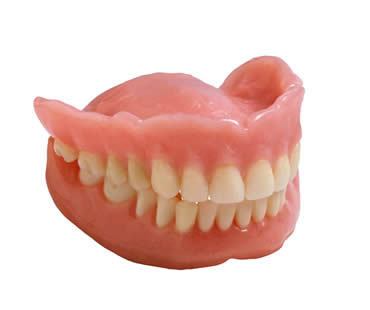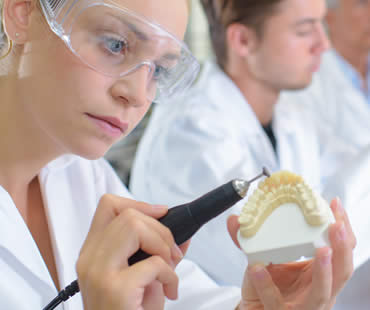
If you have lost all of your teeth or just a few, you are probably a good candidate for dentures. Dentures, also known as removable prosthodontics, are used for the dental restoration or replacement of missing or broken teeth. You may want to consider dentures if any of the following apply to your situation:
- You have very few remaining teeth and they are in poor condition.
- You have suffered bone loss in your mouth so severe it precludes you from considering dental implants.
- You have advanced gum disease that has resulted in the loss of multiple teeth.
- You have lost many teeth, and your remaining teeth are suffering from decay and receding gums.
- You are committed to practicing excellent oral hygiene in order to take good care of your dentures.
You may not be a good candidate for dentures if any of the following apply:
- You are a young patient whose jawbone has not fully developed.
- You grind or clench your teeth.
- You have a sensitive gag reflex.
- You are a smoker.
If you feel you are a good candidate for dentures, your dentist will evaluate the health of your teeth and gums and determine if full or partial dentures are the best choice for you. There are many factors to consider when having dentures placed, and your dental professional can help you make a decision that fits your needs and lifestyle. If you wish to regain oral functionality and improve your smile, dentures may be your answer to once again enjoying a full set of beautiful, natural looking teeth.
Schedule your appointment at our Meriden dental office

With an estimated 49 million adults in the United States wearing dentures, there are lots of lessons learned about wearing them. Virtually everyone will say that it took a little adjustment time before they were comfortable and confident with their new teeth. It can help to know what to expect with wearing dentures at first.
Your dentures may feel very strange the first day you get them. They can seem too big for your mouth, and as though your lips are out of place. These strange sensations will disappear with time. You may also notice more saliva than usual in your mouth. This is a natural response of your mouth as it grows accustomed to the appliance.
A liquid diet is recommended by many dentists for the first couple of days after getting dentures. Then you may begin eating soft foods, like cooked vegetables, eggs, and fish. Take small bites and chew slowly. Avoid biting into foods with your front teeth.
Mouth soreness from your dentures should go away after a few days. If it lasts longer than a week, call your dentist to ask if you should be seen. You may experience minor mouth sores for the first couple of weeks that you wear dentures. This is normal as you give your mouth time to adjust. If the sores are severe, call your dentist.
Dentists recommend that you remove your dentures for a minimum of eight hours each day to give your gums a rest. Most patients do this at night while sleeping. Your dentist will provide instructions about how to care for your dentures and where to store them when not wearing them. Be sure to follow the instructions for care to ensure that your dentures last as long as possible.
We look forward to seeing you in our Meriden dental office

If you have been living with a mouth full of badly decayed teeth, infected gums or painful tooth infections, your dentist may have talked to you about how dentures can transform your smile. While no one wants to extract all of his or her teeth and have no remaining natural teeth, if your teeth have been a source of pain and embarrassment to you for years, having a beautiful new set of dentures could sincerely change your life.
Dentures are very natural-appearing replacements for an entire mouth of missing natural teeth and gum tissue. Dentures are removable and can be cleaned thoroughly each day, unlike examples like dental crowns or dental bridges that are permanently affixed to your mouth.
Badly decayed teeth and other oral issues can lead to chronic pain that spreads from the mouth to other areas of the face, head and neck. This pain can disrupt your life, leaving you irritable and moody, causing you to isolate yourself. Pain medications can lead you to feel groggy or off-balance, affecting your interactions with others in a negative manner. Once those teeth are removed and any underlying infection is addressed, you will be shocked at how much better you feel. The absence of this once-ongoing pain will feel as though you are free of a great burden you hadn’t realized you were carrying.
Years of poor oral health might have left you unwilling to smile broadly, or to be uncomfortable in public speaking, laughing or eating and drinking. You may avoid friends and family and you might choose not to form new relationships easily. Once your damaged teeth have been removed and you have been fitted for dentures, you will be amazed at the “new you.” The bright, perfect white smile that greets you in the mirror may look like a movie star’s smile, but in fact, it’s your smile. With your new dentures, you can feel confident as you move through life.
If you need a dentist in Meriden contact us today

If you have chosen dentures to restore the function and appearance of your mouth, you certainly want them to do their job. Typically, if fitted correctly and you follow the instructions for use and care, dentures are a good solution. However, it’s possible for problems to arise so it’s important to recognize issues and how to handle them.
One key thing about dentures is that they must fit properly. If not, problems like gum irritation, difficulty eating and speaking, mouth infections, and denture movement may occur. Also, if you don’t keep your mouth clean and healthy, problems will likely appear.
If you experience any issues with your mouth after getting dentures, see your dentist right away. It’s possible that over time, your bones and gums can change and alter the fit of your dentures. When this happens, your dentist must determine if modification, adjustment, or replacement is needed. Never try to adjust your dentures yourself.
Here are some things you can do at home to keep your dentures in good condition:
- Handle them carefully. When holding your dentures, place a towel on the counter or stand over a water-filled sink. This will protect them if you drop them.
- Keep dentures out of reach of children and pets.
- Do not sleep with your dentures in your mouth.
- Clean them daily according to your dentist’s instructions. This includes soaking them overnight in a denture cleanser, cleaning them well each morning before wearing them, and cleaning your mouth carefully before inserting the dentures. Use a soft brush or one designed for dentures, plain soap or cleanser recommended by your dentist, and warm water. Never use bleach or household cleansers.
- Store your dentures in warm water or denture cleaning solution. Do not use hot water, which can cause them to lose their shape.
- Do not use toothpicks because they can damage dentures.
Wearing dentures may be tricky at first, and it may take some time to grow accustomed to them. However, if you care for them well and see your dentist for routine checkups, you can avoid most of the problems that denture-wearers sometimes encounter.
Our dental office is located in Meriden

Dentures have been around a long time as a way to restore smiles plagued by missing teeth. They provide a solution for people who want to smile, talk, and eat as normally as possible. Unfortunately, removable dentures aren’t without issues. They can become loose or shift, making it uncomfortable to eat and talk. Messy denture adhesives are bothersome and ineffective for some patients. Therefore, advancements in dental technology have developed the option of permanent dentures.
What are permanent dentures?
Permanent, or fixed, dentures are suitable for patients missing one, two, or more teeth. The appliance is made up of a row of crowns or artificial teeth, which are connected together and the framework is supported by dental implants. The implants act like natural tooth roots, and the permanent dentures create a bite similar to natural teeth.
What are the benefits?
Fixed dentures definitely offers some advantages to removable ones. The need for messy adhesives is eliminated, and you don’t have to worry about loose or ill-fitting dentures affecting you. The force of your bite is also improved, so you can eat all kinds of foods without concern. Because a permanent upper denture doesn’t cover the roof of your mouth, your ability to taste and enjoy food is not sacrificed. This kind of denture stays in place for normal oral hygiene, so there are no special cleaning or soaking requirements. If properly maintained, permanent dentures can last for many years or even a lifetime.
Are there any disadvantages?
Permanent dentures are susceptible to oral problems like infection or inflammation because they are not removable. Also, it is possible that the crowns may require replacement in 10 to 15 years.
We treat patients from Meriden and the surrounding area

If you are currently a denture wearer, you know that dentures can be problematic when it comes to eating a wide variety of foods, especially those foods with a very crunchy or chewy texture. Dentures can click or move when you are eating, or food debris can collect underneath, leading to poor fit and irritation of the soft palate and gums. Over time, if your dentures aren’t properly cleaned, this can lead to an odor in the dentures that causes bad breath for the wearer.
Issues with stability and retention of standard dentures mean that many wearers have food restrictions, including healthful and fresh foods they previously enjoyed with their healthy natural teeth. Some of the most nutritious foods available are problematic for denture wearers, making chewing difficult. Because so much of the digestion process begins in the mouth with the mastication of food, poorly chewed food can cause digestion difficulties and eventually be a factor in overall poor health.
Standard dentures can also affect the enjoyment of eating the foods that are allowed. They can be bulky, especially on the roof of the mouth, taking away a large part of savoring the texture and flavor of foods.
Hybrid dentures address all of these issues. They are crafted so that the roof of the mouth remains completely open and uncovered. Texture and flavor are enhanced over typical dentures. Hybrid dentures are affixed firmly with four or more dental implants functioning as anchors. These denture anchors are extremely secure and stable, giving the wearer the confidence to eat, drink, and speak.
Talk to your dentist today to see if hybrid dentures can improve your life. Experience the positive effects of hybrid dentures as your put your best smile forward with confidence that it looks and functions virtually identically to your natural teeth and gums.
If you need a dentist in Meriden contact us today














